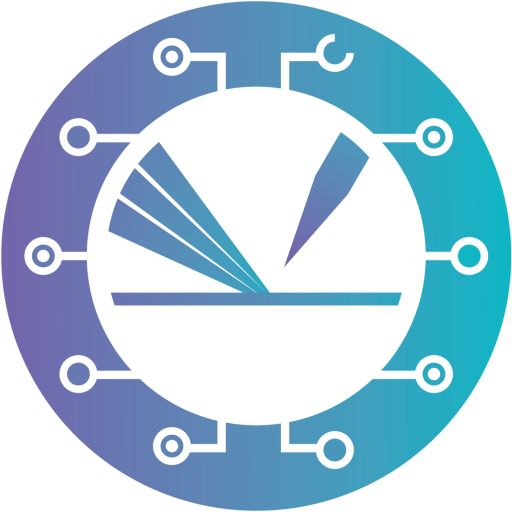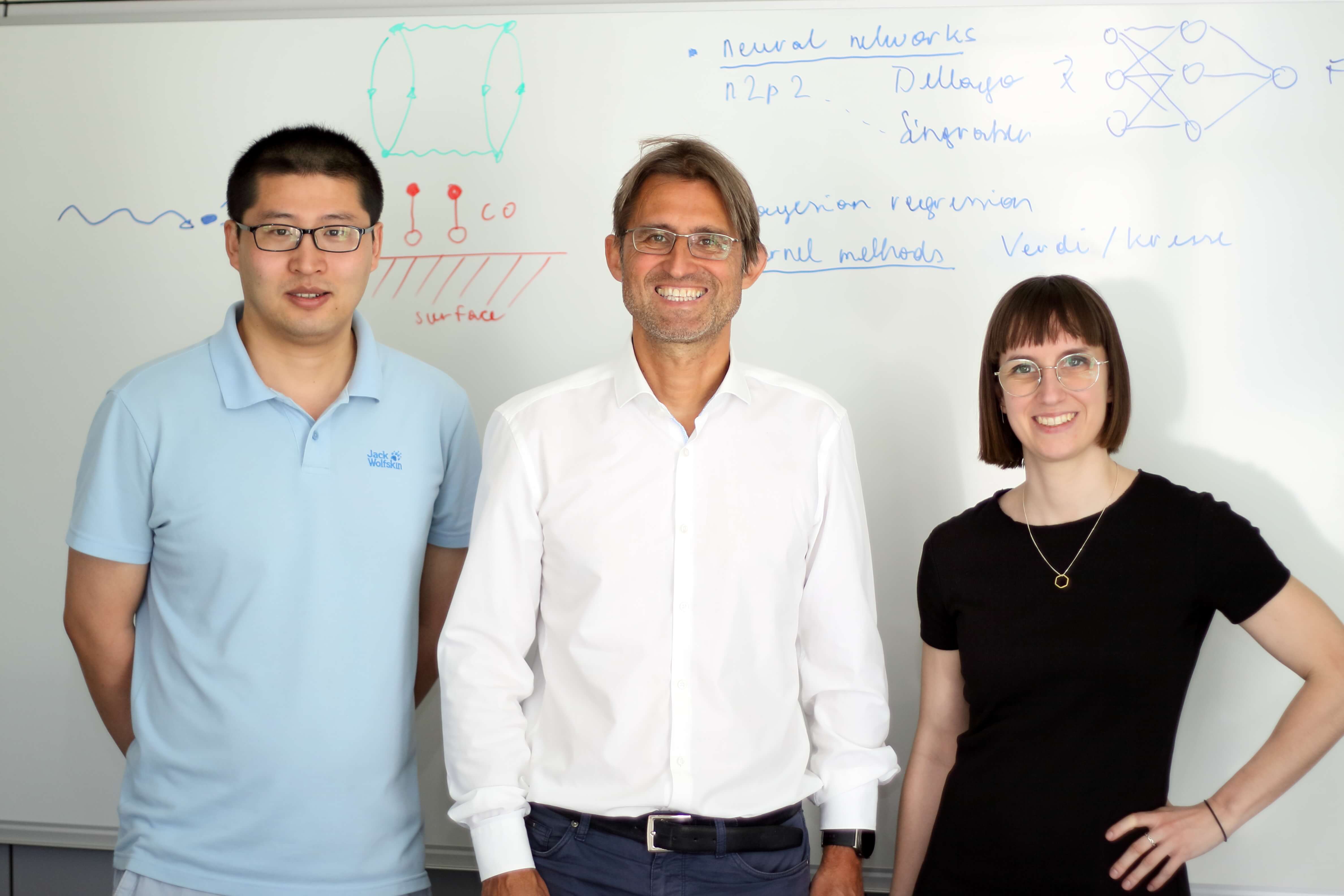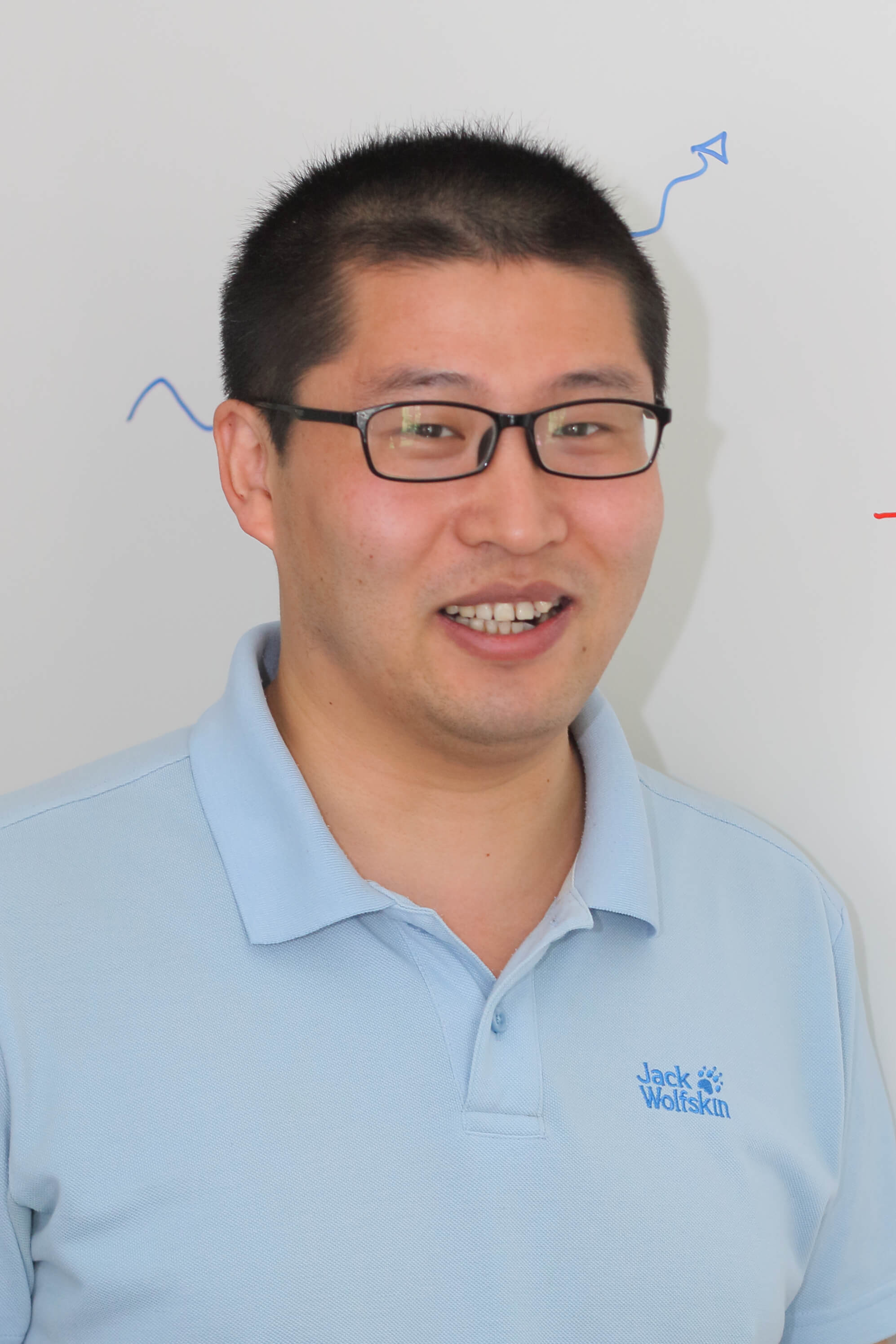Bayesian regression for
multi-level machine-learned potentials
Subproject P03
The first-principles description of the properties of multi-component metal oxides is an exceedingly challenging problem. The reasons are that the configurational space grows exponentially with the number of species and standard Density Functional Theory (DFT) is often not accurate enough. The long-term objective of P03 is to accelerate first-principles calculations by developing machine-learning approaches for the description of the interatomic forces, Born effective charges, and other tensorial properties of multivalent oxides. The project will rely on kernel-based methods and Bayesian inference to implement fully automatic “on-the-fly” learning.
In the first project period, we will develop machine-learned force fields (MLFF) for DFT and DFT+U, whereby the number of components in the FF will be gradually increased. A concise framework for learning tensorial properties will be implemented. We will use this to simulate infrared spectra of oxide materials, which can be readily compared to the finite-temperature spectra measured by the experimental groups.
The difference between DFT and hybrid functionals will be machine-learned to go beyond semi-local functionals (Delta-learning). The long-term perspective is to extend this approach to highly accurate beyond-DFT methods, such as the random phase approximation and quantum chemistry (coupled cluster) methods. Although kernel-based methods are exceedingly accurate, they are often less efficient than NN. We will collaborate with other projects to recast the on-the-fly trained FF into NN potentials to address this issue.
Expertise
The main research efforts of the group are directed towards the development of quantum-mechanical tools for atomic-scale simulations of properties and processes in materials and the application of these methodologies to key areas of condensed matter physics and materials research. An important pillar of the research is the Vienna Ab initio Simulation Package (VASP), a general-purpose ab initio code for solving the many-electron Schrödinger equation. The code is among the world leaders in its field, with more than 3500 licensees worldwide. We have expertise with simulations for a vast number of properties using many different techniques:
- Density functional theory (DFT), including spin and non-collinear DFT
- Linear response theory to calculate phonons and dielectric properties
- Hartree-Fock techniques and many flavors of hybrid functionals
- Many-body perturbation theory, including GW and Bethe-Salpeter
- Wavefunction-based correlated methods (Møller-Plesset perturbation theory)
- Surface science, including growth and oxide formation
- Simulation of nanostructures
- Semiconductor physics: charge trapping, polarons
- Electronic excitations
- Defect energies in extended systems
For TACO, we will adapt our machine-learning techniques to tensorial properties and correlated wavefunction techniques. These techniques are directly integrated into VASP and allow to accelerate finite-temperature simulations by many orders of magnitudes.
Team
Former Members
Publications
2024
de Hijes, Pablo Montero; Dellago, Christoph; Jinnouchi, Ryosuke; Schmiedmayer, Bernhard; Kresse, Georg
Journal ArticleOpen AccessIn: The Journal of Chemical Physics, vol. 160, iss. 11, no. 114107, 2024.
Abstract | Links | BibTeX | Tags: P03, P12
@article{10.1063/5.0197105,
title = {Comparing machine learning potentials for water: Kernel-based regression and Behler–Parrinello neural networks},
author = {Pablo Montero de Hijes and Christoph Dellago and Ryosuke Jinnouchi and Bernhard Schmiedmayer and Georg Kresse},
doi = {https://doi.org/10.1063/5.0197105},
year = {2024},
date = {2024-03-20},
urldate = {2024-03-20},
journal = {The Journal of Chemical Physics},
volume = {160},
number = {114107},
issue = {11},
abstract = {In this paper, we investigate the performance of different machine learning potentials (MLPs) in predicting key thermodynamic properties of water using RPBE + D3. Specifically, we scrutinize kernel-based regression and high-dimensional neural networks trained on a highly accurate dataset consisting of about 1500 structures, as well as a smaller dataset, about half the size, obtained using only on-the-fly learning. This study reveals that despite minor differences between the MLPs, their agreement on observables such as the diffusion constant and pair-correlation functions is excellent, especially for the large training dataset. Variations in the predicted density isobars, albeit somewhat larger, are also acceptable, particularly given the errors inherent to approximate density functional theory. Overall, this study emphasizes the relevance of the database over the fitting method. Finally, this study underscores the limitations of root mean square errors and the need for comprehensive testing, advocating the use of multiple MLPs for enhanced certainty, particularly when simulating complex thermodynamic properties that may not be fully captured by simpler tests.},
keywords = {P03, P12},
pubstate = {published},
tppubtype = {article}
}
2023
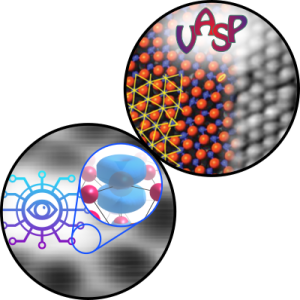
Verdi, Carla; Ranalli, Luigi; Franchini, Cesare; Kresse, Georg
Journal ArticleIn: Physical Review Materials, vol. 7, no. 3, pp. l030801, 2023.
Abstract | Links | BibTeX | Tags: P03, P07
@article{Verdi2023,
title = {Quantum paraelectricity and structural phase transitions in strontium titanate beyond density functional theory},
author = {Carla Verdi and Luigi Ranalli and Cesare Franchini and Georg Kresse},
doi = {10.1103/physrevmaterials.7.l030801},
year = {2023},
date = {2023-03-16},
journal = {Physical Review Materials},
volume = {7},
number = {3},
pages = {l030801},
publisher = {American Physical Society (APS)},
abstract = {We demonstrate an approach for calculating temperature-dependent quantum and anharmonic effects with beyond density-functional theory accuracy. By combining machine-learned potentials and the stochastic self-consistent harmonic approximation, we investigate the cubic to tetragonal transition in strontium titanate and show that the paraelectric phase is stabilized by anharmonic quantum fluctuations. We find that a quantitative understanding of the quantum paraelectric behavior requires a higher-level treatment of electronic correlation effects via the random phase approximation. This approach enables detailed studies of emergent properties in strongly anharmonic materials beyond density-functional theory.},
keywords = {P03, P07},
pubstate = {published},
tppubtype = {article}
}

Ranalli, Luigi; Verdi, Carla; Monacelli, Lorenzo; Kresse, Georg; Calandra, Matteo; Franchini, Cesare
Journal ArticleOpen AccessIn: Advanced Quantum Technology, vol. 6, iss. 4, 2023.
Abstract | Links | BibTeX | Tags: P03, P07
@article{Ranalli2023,
title = {Temperature-dependent anharmonic phonons in quantum paraelectric KTaO_{3} by first principles and machine-learned force fields},
author = {Luigi Ranalli and Carla Verdi and Lorenzo Monacelli and Georg Kresse and Matteo Calandra and Cesare Franchini},
doi = {10.1002/qute.202200131},
year = {2023},
date = {2023-02-22},
urldate = {2023-02-22},
journal = {Advanced Quantum Technology},
volume = {6},
issue = {4},
abstract = {Understanding collective phenomena in quantum materials from first principles is a promising route toward engineering materials properties and designing new functionalities. This work examines the quantum paraelectric state, an elusive state of matter characterized by the smooth saturation of the ferroelectric instability at low temperature due to quantum fluctuations associated with anharmonic phonon effects. The temperature-dependent evolution of the soft ferroelectric phonon mode in the quantum paraelectric KTaO_{3} in the range 0–300 K is modeled by combining density functional theory (DFT) calculations with the stochastic self-consistent harmonic approximation assisted by an on-the-fly machine-learned force field. The calculated data show that including anharmonic terms is essential to stabilize the spurious imaginary ferroelectric phonon predicted by DFT in the harmonic approximation, in agreement with experiments. Augmenting the DFT workflow with machine-learned force fields allows for efficient stochastic sampling of the configuration space using large supercells in a wide temperature range, inaccessible to conventional ab initio protocols. This work proposes a robust computational workflow capable of accounting for collective behaviors involving different degrees of freedom and occurring at large time/length scales, paving the way for precise modeling and control of quantum effects in materials.},
keywords = {P03, P07},
pubstate = {published},
tppubtype = {article}
}
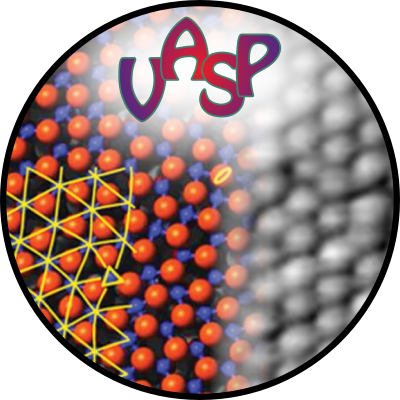
Liu, Peitao; Wang, Jiantao; Avargues, Noah; Verdi, Carla; Singraber, Andreas; Karsai, Ferenc; Chen, Xing-Qiu; Kresse, Georg
Journal ArticleIn: Physical Review Letters, vol. 130, no. 7, pp. 078001, 2023.
Abstract | Links | BibTeX | Tags: P03
@article{Liu2023,
title = {Combining Machine Learning and Many-Body Calculations: Coverage-Dependent Adsorption of CO on Rh(111)},
author = {Peitao Liu and Jiantao Wang and Noah Avargues and Carla Verdi and Andreas Singraber and Ferenc Karsai and Xing-Qiu Chen and Georg Kresse},
doi = {10.1103/physrevlett.130.078001},
year = {2023},
date = {2023-02-17},
urldate = {2023-02-01},
journal = {Physical Review Letters},
volume = {130},
number = {7},
pages = {078001},
publisher = {American Physical Society (APS)},
abstract = {Adsorption of carbon monoxide (CO) on transition-metal surfaces is a prototypical process in surface sciences and catalysis. Despite its simplicity, it has posed great challenges to theoretical modeling. Pretty much all existing density functionals fail to accurately describe surface energies and CO adsorption site preference as well as adsorption energies simultaneously. Although the random phase approximation (RPA) cures these density functional theory failures, its large computational cost makes it prohibitive to study the CO adsorption for any but the simplest ordered cases. Here, we address these challenges by developing a machine-learned force field (MLFF) with near RPA accuracy for the prediction of coverage-dependent adsorption of CO on the Rh(111) surface through an efficient on-the-fly active learning procedure and a Δ-machine learning approach. We show that the RPA-derived MLFF is capable to accurately predict the Rh(111) surface energy and CO adsorption site preference as well as adsorption energies at different coverages that are all in good agreement with experiments. Moreover, the coverage-dependent ground-state adsorption patterns and adsorption saturation coverage are identified.},
keywords = {P03},
pubstate = {published},
tppubtype = {article}
}
2022
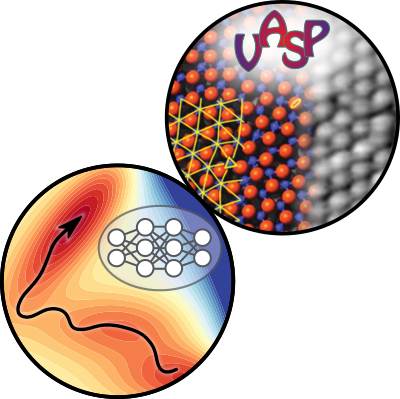
Tröster, Andreas; Verdi, Carla; Dellago, Christoph; Rychetsky, Ivan; Kresse, Georg; Schranz, Wilfried
Hard antiphase domain boundaries in strontium titanate unravelled using machine-learned force fields
Journal ArticleIn: Physical Review Materials, vol. 6, no. 9, pp. 094408, 2022.
Abstract | Links | BibTeX | Tags: P03, P12
@article{Troester2022,
title = {Hard antiphase domain boundaries in strontium titanate unravelled using machine-learned force fields},
author = {Andreas Tröster and Carla Verdi and Christoph Dellago and Ivan Rychetsky and Georg Kresse and Wilfried Schranz},
doi = {10.1103/physrevmaterials.6.094408},
year = {2022},
date = {2022-09-16},
urldate = {2022-09-16},
journal = {Physical Review Materials},
volume = {6},
number = {9},
pages = {094408},
publisher = {American Physical Society (APS)},
abstract = {We investigate the properties of hard antiphase boundaries in SrTiO_{3} using machine-learned force fields. In contrast to earlier findings based on standard \textit{ab initio} methods, for all pressures up to 120kbar the observed domain wall pattern maintains an almost perfect Néel character in quantitative agreement with Landau-Ginzburg-Devonshire theory, and the in-plane polarization P_{3} shows no tendency to decay to zero. Together with the switching properties of P_{3} under reversal of the Néel order parameter component, this provides hard evidence for the presence of rotopolar couplings. The present approach overcomes the severe limitations of \textit{ab initio} simulations of wide domain walls and opens avenues toward concise atomistic predictions of domain-wall properties even at finite temperatures.},
keywords = {P03, P12},
pubstate = {published},
tppubtype = {article}
}

Liu, Peitao; Verdi, Carla; Karsai, Ferenc; Kresse, Georg
Phase transitions of zirconia: Machine-learned force fields beyond density functional theory
Journal ArticleIn: Physical Review B, vol. 105, no. 6, pp. L060102, 2022.
Abstract | Links | BibTeX | Tags: P03
@article{Liu2022,
title = {Phase transitions of zirconia: Machine-learned force fields beyond density functional theory},
author = {Peitao Liu and Carla Verdi and Ferenc Karsai and Georg Kresse},
doi = {10.1103/physrevb.105.l060102},
year = {2022},
date = {2022-02-16},
journal = {Physical Review B},
volume = {105},
number = {6},
pages = {L060102},
publisher = {American Physical Society (APS)},
abstract = {Machine-learned force fields (MLFFs) are increasingly used to accelerate first-principles simulations of many materials properties. However, MLFFs are generally trained from density functional theory (DFT) data and thus suffer from the same limitations as DFT. To achieve more predictive accuracy, MLFFs based on higher levels of theory are required, but the training becomes exceptionally arduous. Here, we present an approach to generate MLFFs with beyond DFT accuracy which combines an efficient on-the-fly active learning method and Δ-machine learning. Using this approach, we generate an MLFF for zirconia based on the random phase approximation (RPA). Specifically, an MLFF trained on the fly during DFT-based molecular dynamics simulations is corrected by another MLFF that is trained on the differences between RPA and DFT calculated energies, forces, and stress tensors. We show that owing to the relatively smooth nature of these differences, the expensive RPA calculations can be performed only on a small number of representative structures of small unit cells selected by rank compression of the kernel matrix. This dramatically reduces the computational cost and allows one to generate an MLFF fully capable of reproducing high-level quantum-mechanical calculations beyond DFT. We carefully validate our approach and demonstrate its success in studying the phase transitions of zirconia. These results open the way to many-body calculations of finite-temperature properties of materials.},
keywords = {P03},
pubstate = {published},
tppubtype = {article}
}
2021

Verdi, Carla; Karsai, Ferenc; Liu, Peitao; Jinnouchi, Ryosuke; Kresse, Georg
Journal ArticleOpen AccessIn: npj Computational Materials, vol. 7, pp. 156, 2021.
Abstract | Links | BibTeX | Tags: P03
@article{Verdi2021,
title = {Thermal transport and phase transitions of zirconia by on-the-fly machine-learned interatomic potentials},
author = {Carla Verdi and Ferenc Karsai and Peitao Liu and Ryosuke Jinnouchi and Georg Kresse},
doi = {10.1038/s41524-021-00630-5},
year = {2021},
date = {2021-09-30},
urldate = {2021-09-30},
journal = {npj Computational Materials},
volume = {7},
pages = {156},
publisher = {Springer Science and Business Media LLC},
abstract = {Machine-learned interatomic potentials enable realistic finite temperature calculations of complex materials properties with first-principles accuracy. It is not yet clear, however, how accurately they describe anharmonic properties, which are crucial for predicting the lattice thermal conductivity and phase transitions in solids and, thus, shape their technological applications. Here we employ a recently developed on-the-fly learning technique based on molecular dynamics and Bayesian inference in order to generate an interatomic potential capable to describe the thermodynamic properties of zirconia, an important transition metal oxide. This machine-learned potential accurately captures the temperature-induced phase transitions below the melting point. We further showcase the predictive power of the potential by calculating the heat transport on the basis of Green–Kubo theory, which allows to account for anharmonic effects to all orders. This study indicates that machine-learned potentials trained on the fly offer a routine solution for accurate and efficient simulations of the thermodynamic properties of a vast class of anharmonic materials.},
keywords = {P03},
pubstate = {published},
tppubtype = {article}
}

Liu, Peitao; Verdi, Carla; Karsai, Ferenc; Kresse, Georg
α-β phase transition of zirconium predicted by on-the-fly machine-learned force field
Journal ArticleIn: Physical Review Materials, vol. 5, no. 5, pp. 053804, 2021.
Abstract | Links | BibTeX | Tags: P03, pre-TACO
@article{Liu2021,
title = {α-β phase transition of zirconium predicted by on-the-fly machine-learned force field},
author = {Peitao Liu and Carla Verdi and Ferenc Karsai and Georg Kresse},
doi = {10.1103/physrevmaterials.5.053804},
year = {2021},
date = {2021-05-24},
journal = {Physical Review Materials},
volume = {5},
number = {5},
pages = {053804},
publisher = {American Physical Society (APS)},
abstract = {The accurate prediction of solid-solid structural phase transitions at finite temperature is a challenging task, since the dynamics is so slow that direct simulations of the phase transitions by first-principles (FP) methods are typically not possible. Here, we study the α−β phase transition of Zr at ambient pressure by means of on-the-fly machine-learned force fields. These are automatically generated during FP molecular dynamics (MD) simulations without the need of human intervention, while retaining almost FP accuracy. Our MD simulations successfully reproduce the first-order displacive nature of the phase transition, which is manifested by an abrupt jump of the volume and a cooperative displacement of atoms at the phase transition temperature. The phase transition is further identified by the simulated x-ray powder diffraction, and the predicted phase transition temperature is in reasonable agreement with experiment. Furthermore, we show that using a singular value decomposition and pseudo inversion of the design matrix generally improves the machine-learned force field compared to the usual inversion of the squared matrix in the regularized Bayesian regression.},
keywords = {P03, pre-TACO},
pubstate = {published},
tppubtype = {article}
}

Jinnouchi, Ryosuke; Karsai, Ferenc; Verdi, Carla; Kresse, Georg
First-principles hydration free energies of oxygenated species at water–platinum interfaces
Journal ArticleIn: The Journal of Chemical Physics, vol. 154, no. 9, pp. 094107, 2021.
Abstract | Links | BibTeX | Tags: P03, pre-TACO
@article{Jinnouchi2021,
title = {First-principles hydration free energies of oxygenated species at water–platinum interfaces},
author = {Ryosuke Jinnouchi and Ferenc Karsai and Carla Verdi and Georg Kresse},
doi = {10.1063/5.0036097},
year = {2021},
date = {2021-03-01},
journal = {The Journal of Chemical Physics},
volume = {154},
number = {9},
pages = {094107},
publisher = {AIP Publishing},
abstract = {The hydration free energy of atoms and molecules adsorbed at liquid–solid interfaces strongly influences the stability and reactivity of solid surfaces. However, its evaluation is challenging in both experiments and theories. In this work, a machine learning aided molecular dynamics method is proposed and applied to oxygen atoms and hydroxyl groups adsorbed on Pt(111) and Pt(100) surfaces in water. The proposed method adopts thermodynamic integration with respect to a coupling parameter specifying a path from well-defined non-interacting species to the fully interacting ones. The atomistic interactions are described by a machine-learned inter-atomic potential trained on first-principles data. The free energy calculated by the machine-learned potential is further corrected by using thermodynamic perturbation theory to provide the first-principles free energy. The calculated hydration free energies indicate that only the hydroxyl group adsorbed on the Pt(111) surface attains a hydration stabilization. The observed trend is attributed to differences in the adsorption site and surface morphology.},
keywords = {P03, pre-TACO},
pubstate = {published},
tppubtype = {article}
}
2020

Jinnouchi, Ryosuke; Miwa, Kazutoshi; Karsai, Ferenc; Kresse, Georg; Asahi, Ryoji
On-the-Fly Active Learning of Interatomic Potentials for Large-Scale Atomistic Simulations
Journal ArticleIn: The Journal of Physical Chemistry Letters, vol. 11, no. 17, pp. 6946–6955, 2020.
Abstract | Links | BibTeX | Tags: P03, pre-TACO
@article{Jinnouchi2020,
title = {On-the-Fly Active Learning of Interatomic Potentials for Large-Scale Atomistic Simulations},
author = {Ryosuke Jinnouchi and Kazutoshi Miwa and Ferenc Karsai and Georg Kresse and Ryoji Asahi},
doi = {10.1021/acs.jpclett.0c01061},
year = {2020},
date = {2020-07-31},
journal = {The Journal of Physical Chemistry Letters},
volume = {11},
number = {17},
pages = {6946--6955},
publisher = {American Chemical Society (ACS)},
abstract = {The on-the-fly generation of machine-learning force fields by active-learning schemes attracts a great deal of attention in the community of atomistic simulations. The algorithms allow the machine to self-learn an interatomic potential and construct machine-learned models on the fly during simulations. State-of-the-art query strategies allow the machine to judge whether new structures are out of the training data set or not. Only when the machine judges the necessity of updating the data set with the new structures are first-principles calculations carried out. Otherwise, the yet available machine-learned model is used to update the atomic positions. In this manner, most of the first-principles calculations are bypassed during training, and overall, simulations are accelerated by several orders of magnitude while retaining almost first-principles accuracy. In this Perspective, after describing essential components of the active-learning algorithms, we demonstrate the power of the schemes by presenting recent applications.},
keywords = {P03, pre-TACO},
pubstate = {published},
tppubtype = {article}
}
